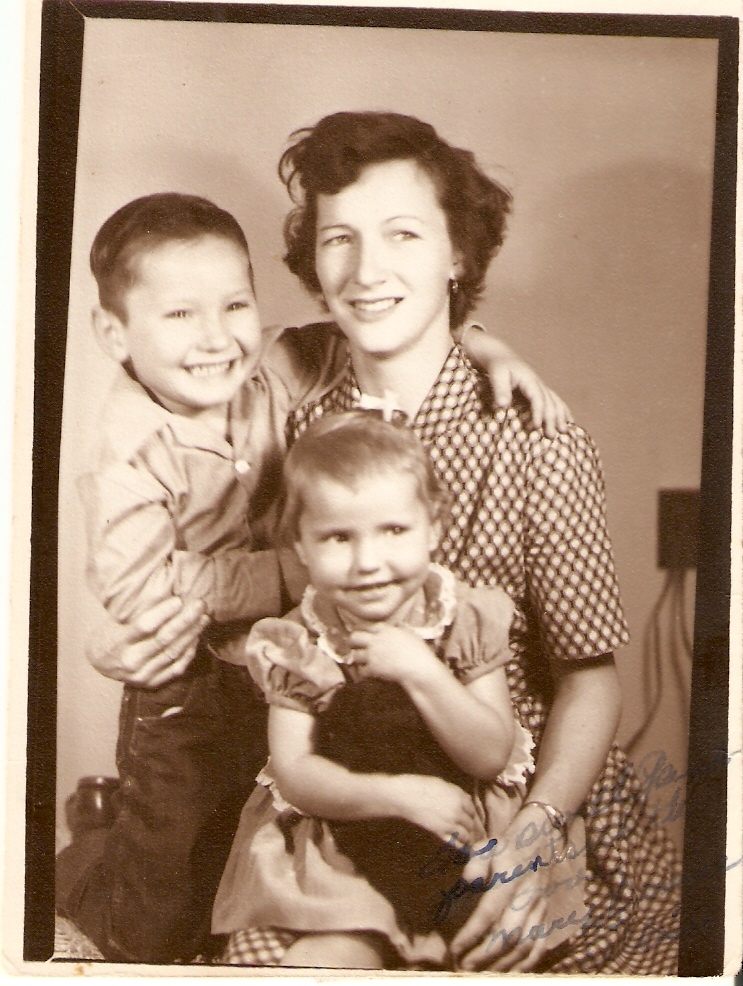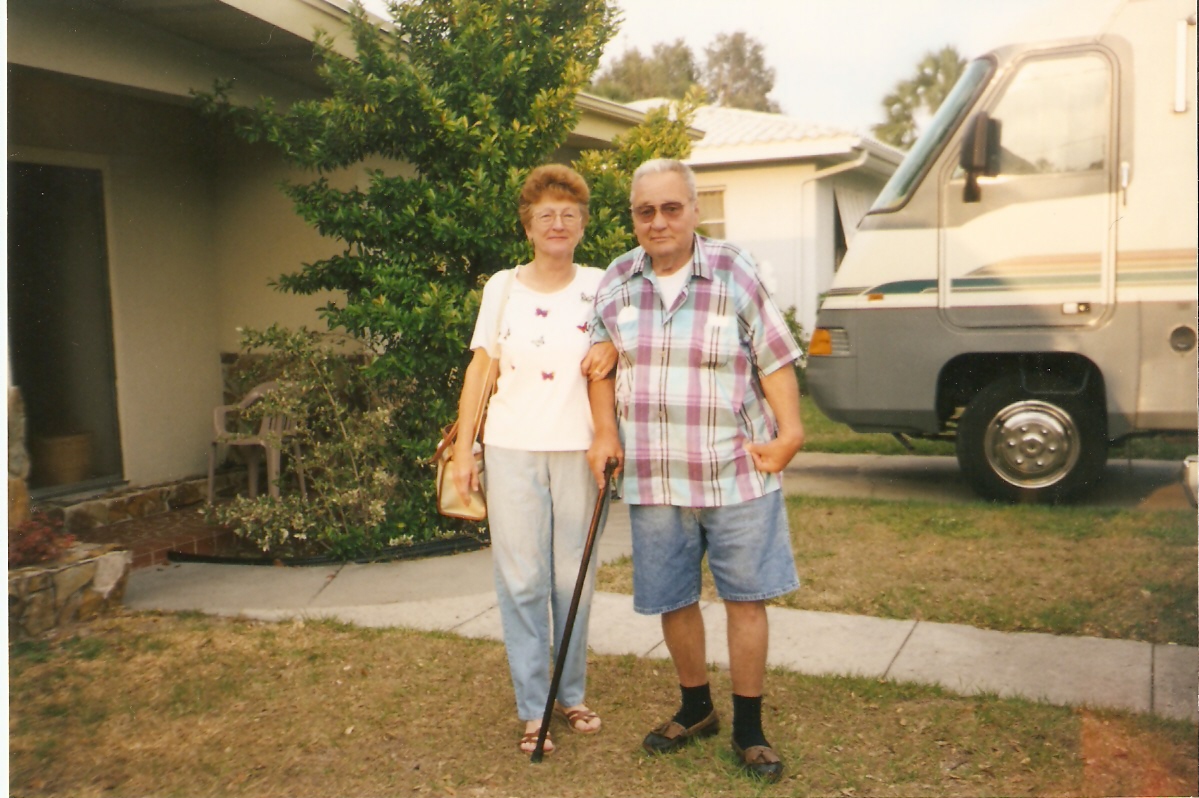TRANSCRIPTION
Where were you born?
-I was born in St Charles, Missouri, I resided there till age 7, and we played in the snow, and I went to kindergarten. My father was working in San Antonio, so moved to San Antonio.
What job did he have?
He was a steel worker.
Do you remember the company name?
No, I don't know, but umm, probably one of the buildings downtown, I really don't know, I can't remember. Then we moved to Harlandale, and I went to Elementary School at Huff Avenue and the Jaral Avenue. When my mother bought a home and we moved, I went to Harlandale Middle school, and then Harlandale High School, big deal.
Do you remember anything from the depression?
No, because I was a depression baby, I was born in 1933 so I don't remember any hard times no. Although, I do remember World War II, we collected cans, we collected papers, we had a victory garden, grew our own vegetables, and we did anything and everything we could to help the war effort.
Let me ask you about polio back then?
Well, we lived in Sanderson, Texas in 1951and 52 during the polio epidemic, there was no swimming pools available, everything was closed down, and we fortunately we did not get polio, but many people did. Around that time they opened up Warm Springs in Texas for rehabilitating people, and for handling people with polio, and it reopened again as a rehabilitation hospital.
When did your father go off to fight in World War II?
He did not serve, because of his bad back, due to his work. He was injured when I was a youngster still in Missouri, he was injured on the job, he was working on the bridge that connected St Charles to St. Louis. Some steel fell on him; he was considered 4F during the war, World War II.
After your father had his back injured did he receive any type of settlement?
No, back then that was in 1935 or 36, I was just a little girl then and that was unheard of, they were just happy to have a job. When you got injured you just hope you could just get up and work again. There were no benefits back then, no government freebies, there was nothing like that back then.
So, where did you meet Grandpa?
I meet him at Terra Wells swimming pool, he had just got out of the Navy, and we meet, courted, got married, and raised a family. He worked at the railroad I stayed at home, for awhile, then I worked, and I worked at an incurrence company.

What was the name of it?
It was American Hospital and Life. I work with them, and then he was transfer to Houston so we moved to Houston, and I worked for Southwest Research Company for a Chinese Professor, Mathematics Professor, which was interesting. Then I was a secretary for the Professor, and then I changed jobs, and went to work for a cemetery, Forest lawn cemetery in Houston, which was another very interesting job.
Why is that?
Because I always had a fascination with the funnel business, as a youngster in my teen's Harlandale opened their first funnel home, and one of our friends was killed on a motorcycle, and the director was very nice and let us go in, and watch the autopsy and prepare the body.
You really watched that?
Yeah, well even as a little kid, when we lived in St Louis at one time we lived next to a funnel home, and we had this swing set, and it was next to the fence the wooden fence that divided the two properties. I was so interested in what was going on over there I climb up on the top of it and walked across, and fell, and had a brain concussion.
So, is that what drew you to the job?
I guess so; it just was interesting how they bought, and sold the plots, and divided them. They need land sales offices, everything needs to be precisely drawn out, and so the ownership of each plot was forever.
What line of work did you go into after that?
After that we moved back to San Antonio, my husband was transferred, and I went to work for U.S.A.A. and did not like it there.
What did you do there?
I was the secretary of the president of the life insurance company there that was just starting up. He was retired military, and really did not know that much about the life incurrence business. It was a fledgling company, I was bored, and didn't have many things to do, so I sat and read magazines all day. I was transferred to the employee's benefits office. I'd pay claims and help with them; that was very interesting, but it was too regimented. I just did not like it.
So, did you sty in the life incurrence business?
Yes, I went to work for a company called, "Great Southern Life" in there sales office, secretary to their manager, and worked there for a number of years. And then he left there, and went with Manufacturers Life, and I went with him. Then he terminated their relationship with them, and started his own incurrence company, and I went with him to help start it, and was there till I retired.
What was the name of the new company?
It was Life Re.
What was your position there?
I was vice-president there.
What work did you do there?
I handled administrative duties, I was administrative vice-president, I developed policies, wrote up policies, filed them with the state, had them approved, trained people, ordered supplies, everything! Then I and my husband retired from the railroad. We sold our house, and traveled full-time to see the country, and we did that until he passed away.

How many states have you been through?
46
How did you end up working and living at the lake?
They had closed down the park for the winter, and this park is the one fishermen use a lot. They passed a petition around to get it opened for the winter, so they needed park attendant, so they asked us if we'd do it for the winter. After my husband passed away I started to work here year round.
Do you have any interesting stories about the lake?
We had a monumental flood in 1998, which said was a 100 year flood, and in 2002 we had a 500 year flood, and most of the parks were under water for 3 months.

How high was the water?
The water was at, I think it was 940 above sea level, and it went over the spillway for the first time since they developed the lake.
Is there anything else you would like to add to this interview?
Oh, don't get me started; I feel the elderly are being discriminated.

